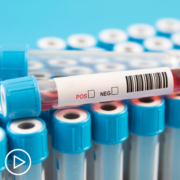What Tests Are Essential to Understand a Myeloma Diagnosis?
What Tests Are Essential to Understand a Myeloma Diagnosis? from Patient Empowerment Network on Vimeo.
Related Programs:

|

|

Making Treatment Decisions | Understanding Common Myeloma Therapies |
Transcript:
Katherine:
Part of accessing more personalized care starts with test results. Dr. Cottini, what testing should take place following a myeloma diagnosis?
Dr. Cottini:
So, once somebody is diagnosed with multiple myeloma, there are different types of tests that we need to get. Some are blood tests, some are urine tests, some are bone marrow tests, and others are just different types of imaging. So, the reason for all these tests is because multiple myeloma can kind of go everywhere and can cause the damage to different types of organs.
So, if we look at blood tests, usually you would see that you get the complete blood count, so we can count the number of red blood cells, white blood cells, and platelets. And then we’ll look at kidney function, through a chemistry profile, calcium levels, multiple myeloma can affect bone cells can affect kidneys. And then, you will see some more sophisticated tests that are really important for the diagnosis of multiple myeloma but also for monitoring and seeing if you’re actually responding to the treatment or you are progressing.
These two tests that you can see are kind of difficult to say, but very important and needs to be remembered. So, one is called serum protein electrophoresis with immunofixation. And the other one is free light chain assays.
And the practicum with these two tests is we can identify the specific marker of the multiple myeloma cells and it is either something monoclonal protein or M-protein or kappa light chain numbers. And as I said before, these numbers can be monitored. So, in response to the treatment, they should go down. And then, unfortunately, if we see progression, they might go up again.
And then, urine tests can also give the same type of numbers. Usually, we have our patient keep the urine for 24 hours, for a day, and we can see if there’s monoclonal proteins or light chains there, too. Then there is a least favorite test of all of them that is the bone marrow testing. So, this is very important for us, because it’s where most of the myeloma cells stay. So, we need to have a look at the bone marrow.
We need like a piece of the bone and some of the liquid tissue to look at specific characteristics of the myeloma. And then, I said before, the myeloma can go to bones, so we need to kind of get some imaging of the bones. These are usually a set of X-rays – it’s called skeletal survey – to see if there is any area that is abnormal or at risk of fractures.
Then, we are also looking at PET scan, which is a more sophisticated test that is based on sugar consumption. We know that myeloma cells and all cancers enjoy sugar, so with the PET scan, we can see visually where the myeloma cells are in the body.
Katherine:
What is cytogenetics?
Dr. Cottini:
So, this is a really interesting question. So, cytogenetics, or FISH tests, are tests that practical tests allow us to look at the chromosomes of the multiple myeloma.
So, everybody has 46 chromosomes, right? Multiple myeloma cells can have more of them or less of them. So, they can have – some myeloma cells have 17 chromosomes instead of 46. So, cytogenetics in the karyotype counts how many chromosomes there are. And then, there is another type of test that is called FISH test, or fluorescence in situ hybridization – I get all the difficult names – that practically look at specific area of chromosome. It can tell us if some areas of chromosomes are lost. That’s what you can read as deletions, or practically missing pieces of chromosomes.
Or there are extra pieces of chromosomes. These are the amplification gains. Or if there are different pieces of chromosomes that stick together. And these are the translocational chromosomes. And all of these data are important for deciding for knowing how aggressive or difficult to treat the myeloma.
Katherine:
Dr. Cottini, what mutations or abnormalities are you looking for?
Dr. Cottini:
So, as Dr. Rosko said, and as I quickly previously mentioned, so there are different types of DNA tests that we can do. One is this FISH test, and that’s a standard test. It’s usually done practically everywhere. And it practically tells us if there are specific deletions or changes.
And we don’t really have yet a specific medication that we know works for specific abnormalities. But all this information is important to decide, as Dr. Rosko said, number of drugs, and maybe that can be helpful in the future when hopefully thanks to the research, we will be able to say, “Based on this abnormality, you would benefit more from this type of treatment.”
There are other types of tests. One is called DNA testing, so we look at the mutation. So, really to point to small changes of a particular gene. This is done not routinely, but I think it can still give lots of good information. And there are lots of genes that are normally myeloma, that has potential drugs that have been studied, those with multiple myeloma and any other type of cancer.






